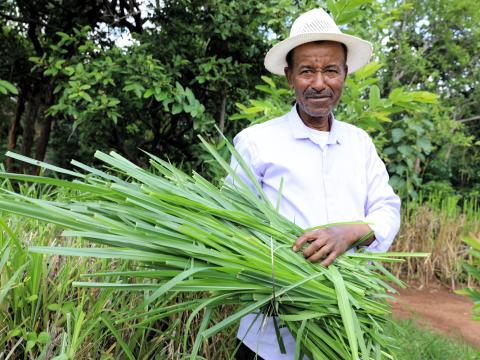A remarkable journey of rejuvenating land through World Vision Natural Regeneration Project

Semah’s childhood memories were filled with the beauty of nature, particularly the lush forest that covered the mountain in front of his house. Young Semah and his friends often ventured into the forest to play and gather fruits, enjoying the serenity of the green surroundings. The now-62-year-old man recalled a happy childhood growing up in Abalashoya Kebele, a small village located in the Humbo district of the Wolayita zone, in the southern part of Ethiopia.
Unfortunately, many years back, a devastating drought struck the country, bringing drastic changes to his community. The forest he cherished began degrading rapidly, and the once breathtaking view disappeared within a few years. The loss of the forest deeply saddened Semah, “It was very hard for me to see the forest was disappearing and I could not do much to stop it.”
Soon after, Semah left his hometown and travelled to the country’s capital city, Addis Ababa, to pursue his education. After completing his studies, he returned to Wolayita and embarked on a career as a lawyer, eventually becoming a respected judge in the area. Despite his success in his professional life, Semah's heart still longed for the restoration of the natural environment he once knew and loved so much.

In 2005, Semah received news that rekindled his hope. He learned about the Humbo Assisted Community-Managed Natural Regeneration (FMNR) Project initiated by World Vision. Having become familiar with the developmental work being carried out by World Vision in the area, he felt a surge of optimism. “I believed that the project could bring about positive change and restore the beauty of the land I once knew,” Semah remembered.
Through the project, World Vision began a massive reforestation effort, including offering awareness-creation training for a targeted community. It also introduced a technique encouraging farmers to selectively prune and manage existing trees and shrubs, making them regenerate and grow back. By doing this, the soil fertility in the area improved, and water retention increased with enhanced biodiversity in the area.
Inspired by World Vision and the community's collaborative efforts, Semah made a life-changing decision. After spending most of his career in the legal field, he returned to his home village eight years ago with a newfound purpose. “My friends and my family thought I was a fool for leaving my stable job and going back to the rural village. But for me, it was a calling,” Semah says.
Semah's decision was not about personal gain or livelihood; it was about his genuine love for the environment and his desire to contribute to its restoration. He has learned about the importance of sustainable land management practices and recognised that he could make a huge difference by implementing everything he knew on his land.
Drawing lessons from World Vision’s project, Semah began to rehabilitate his land. He carefully selected tree species that were indigenous to the area and suitable to the local climate and started growing trees, crops, vegetables, and spices. Semah's dedication and hard work paid off as he witnessed the gradual transformation. The once unfertile and degraded soil started to regain its fertility, and patches of greenery emerged. Now, he has successfully grown more than 30 species of plants, reared cattle, and kept bees on his five hectares of land.

One challenge that Semah faced when he decided to go back was the lack of electricity in his village. Determined to solve the challenge, Semah decided to invest in a biogas digester. He set up the digester on his farm, using animal waste and organic matter as fuel. As the biogas was produced, Semah harnessed its power to fuel his cooking stove and provide lighting for his home. Not only did this innovative technology help him save money, but it also significantly reduced his carbon footprint.
Soon after, Semah became an advocate for sustainable land management practices. He shared his experience and knowledge with fellow farmers, encouraging them to adopt FMNR techniques and highlighting the importance of preserving and regenerating natural resources. “I have trained many farmers in the neighbourhood who are applying the techniques very well. Most of the farmers are now producing more than they used to,” Semah says. His story serves as an inspiration not only to his community but also to all those who encounter similar environmental challenges. It shows the power of individuals to make a difference and the transformative impact of organisations like World Vision.
As Semah continues his journey, he serves as a living proof of the importance of preserving and regenerating natural resources. His real-life stories of hope inspire others to follow suit and contribute to the restoration of our fragile ecosystems. The story of Semah, the once-disappointed nature lover turned environmental champion, will forever stand as a testament to the transformative power of inspiration, dedication, and the enduring connection with humans and nature. Since 2005, the Humbo Assisted Community Managed Natural Regeneration project has rehabilitated more than 2,800 hectares of degraded land through FMNR practices.
By Bethel Shiferaw, Communication Coordinator (HEA), World Vision Ethiopia